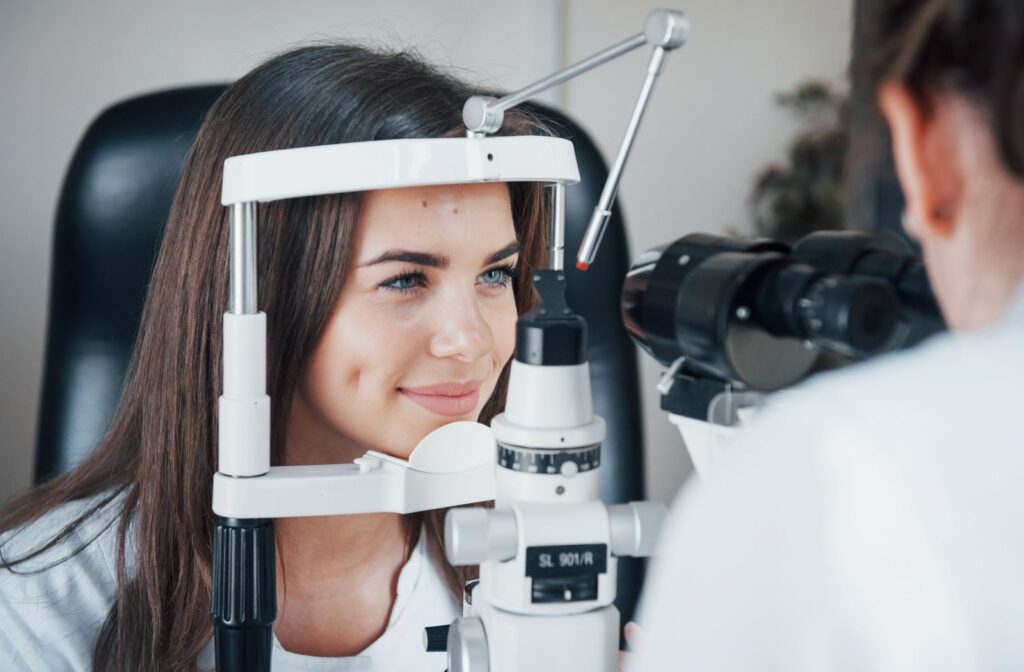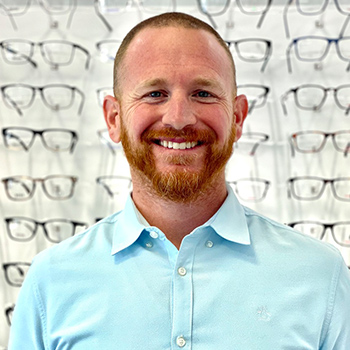Comprehensive eye exams are essential for maintaining good vision. They offer a thorough examination of your eyes beyond just checking your ability to see clearly. In today’s world, where screens are a constant presence, taking care of your eye health is more important than ever.
A comprehensive eye exam includes tests and assessments to check your total eye health and vision.
What Is Involved in a Comprehensive Eye Exam?
A comprehensive eye exam is more than just a simple vision check. It is an in-depth, professional evaluation of your eyes, including both vision and health assessments. It’s like a physical for your eyes, but instead of checking your heartbeat, we check your visual acuity and overall eye health.
Eye exams are essential for detecting early signs of potential eye diseases. Many eye conditions—like glaucoma—progress with no symptoms, so early detection during an eye exam can mean preserving your vision and preventing irreversible damage.
How Often Should You Get an Eye Exam?
The frequency of your eye exams may vary depending on your age, overall health, and any pre-existing conditions.
Most adults 18–60 with no vision problems or risk factors only need a comprehensive eye exam every 1–2 years. However, if you have a family history of eye diseases or are experiencing changes in your vision, it’s essential to schedule an appointment with an optometrist immediately.
Children should also receive regular eye exams as their eyes are still developing. The American Optometric Association recommends children have their first comprehensive eye exam at 6 months, again at age 3 and once more before starting school, and then annually during their school years. This frequency helps ensure their eyes are developing properly and catch any potential issues early.
Steps Involved in a Comprehensive Eye Exam
A comprehensive eye exam typically lasts 30 minutes to an hour but can vary. If you have a complex case or require extra tests, your exam may take longer.
If you’re concerned about the time commitment, mention it when scheduling your appointment. The doctor’s office can give you a more precise estimate based on your individual situation.
Pre-Exam Procedures
When you arrive, you’ll be asked to fill out some paperwork about your medical history and vision concerns. This is the “getting to know you” stage, where our team will align your past information with your current status.
Visual Acuity Test
Remember reading random letters off a chart? That’s the visual acuity test—a quick assessment of how sharp your eyesight is.
Refraction Assessment
During a refraction assessment, your eye doctor will use a refractor to determine your ideal prescription for glasses or contacts. This process involves switching different lenses in front of your eyes and asking you which one makes the letters on the chart look clearer.
This test aims to find the lens that gives you the clearest vision. Your eye doctor may also ask you questions about any visual difficulties you may be experiencing, such as blurriness or trouble seeing at night. This information helps them tailor your prescription even further.
Eye Health Evaluation
Here’s where things get comprehensive. Your eye doctor will examine your eyes’ internal and external health, looking for signs of eye conditions or diseases. They will also look for any abnormalities in the shape or size of your eyes.
During this evaluation, your eye doctor may use various tools and techniques. One common exam is the slit-lamp exam, which uses a bright light and magnifying lens to observe your internal eye structures.
Your eye doctor may also use special technology to look at the back of your eye, including the retina and optic nerve. They may also perform tests to check your peripheral vision and color vision.
In addition to assessing your overall eye health, this evaluation can also catch early signs of other health conditions such as high blood pressure, diabetes, and certain types of cancer.
Additional Tests (If Needed)
Occasionally, you might need extra testing. This could include a visual field test to check for blind spots or changes in your peripheral vision. Your eye doctor may also use tonometry, a test that measures the pressure inside your eye and can detect glaucoma.
Other possible tests include corneal topography to measure the curvature of your cornea, retinal photography to take detailed images of the back of your eye, and tests to measure the thickness of your cornea.
These additional tests are essential for a thorough evaluation and can provide valuable information about your eye health.
Discussion of Findings & Recommendations
At the end, you’ll have a conversation with your doctor about what they found and what it means for your eyesight and overall health, complete with recommendations for glasses, contacts, or treatment plans.
Does Insurance cover Comprehensive Eye Exams?
Every insurance plan is different, so check with your provider before your appointment to see if your specific plan covers exams. Many insurance plans do offer some form of coverage.
Our eyes help us see all the beauty in the world. Isn’t that something worth protecting? Contact Dr. Bittel Optometry for your next eye exam and book an appointment today.


